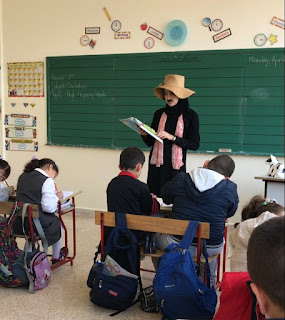Some English speakers use the grammar properly,
but in fact don’t know the main reason behind such usages. This goes back to
what is subconsciously found in one’s mental knowledge.
According to the “Grammaticality
Judgment Task”, I’d question
students based on a rule I’d like to introduce them to. Let’s say the lesson is
about Compound Words, I’d wear a raincoat and sunglasses and ask students to
relate between the words that parallel with my outfit parts. After I point out
what Compound words are, students would observe real world data (according to
the Observational Adequate Grammar) and then consciously notice
the syntactic structure of how words are formed and therefore learn it. This
would result in the Parameterization of the word order and structure.
So let’s say I’m discussing what Nouns
are for grade 5, specifically Concrete Nouns, I’d highlight that it’s basically
a person, place or thing.
After that I’d support them with sentences that have nouns, and based on the findings, students will have to illustrate nouns. When I’m dealing with abstract nouns, I’d try to make the concept concrete as possible. So for example, if I’m introducing them to the word Justice, I’d have the class act out a scenario of a court where there would be a victim and a burglar. Based on my questions of examples and non-examples, I’d highlight that the abstract word is a noun. When it comes to Verbs, the easiest way to instruct it is to have students perform different actions in class. Charade playing is a good way to model verbs, after the word is guessed I’d point out that it’s an action and therefore it’s a verb. When it’s time to get introduced to the Adjective word class, I’d choose a student and then the rest of the class has to describe what they see in this chosen student. Based on their answers, I’d point out that what has been said are Adjectives. For the Prepositional Phrases, I’d bring an empty box with a ball and based on the ball’s position students will have to construct sentences. In each sentence, a preposition will definitely be used and as a response to that I’d have to point out that we use such functional words to unite words and ideas together. For the Adverbs, I’d teach students how to formulate the 3 WH- Helping Question “When-Where-How questions” that are related to the main action in the sentence. With reinforcement activities, not only would pupils develop the skill of selecting the word class but also they would also understand the profound usage of each.
After that I’d support them with sentences that have nouns, and based on the findings, students will have to illustrate nouns. When I’m dealing with abstract nouns, I’d try to make the concept concrete as possible. So for example, if I’m introducing them to the word Justice, I’d have the class act out a scenario of a court where there would be a victim and a burglar. Based on my questions of examples and non-examples, I’d highlight that the abstract word is a noun. When it comes to Verbs, the easiest way to instruct it is to have students perform different actions in class. Charade playing is a good way to model verbs, after the word is guessed I’d point out that it’s an action and therefore it’s a verb. When it’s time to get introduced to the Adjective word class, I’d choose a student and then the rest of the class has to describe what they see in this chosen student. Based on their answers, I’d point out that what has been said are Adjectives. For the Prepositional Phrases, I’d bring an empty box with a ball and based on the ball’s position students will have to construct sentences. In each sentence, a preposition will definitely be used and as a response to that I’d have to point out that we use such functional words to unite words and ideas together. For the Adverbs, I’d teach students how to formulate the 3 WH- Helping Question “When-Where-How questions” that are related to the main action in the sentence. With reinforcement activities, not only would pupils develop the skill of selecting the word class but also they would also understand the profound usage of each.
Highlighting the concept of Plurality is
pivotal as it affects not only the affix usages but also the verb
classification with its proper subject. Just like the other functional
categories, the plurality of nouns must be directly instructed. I’d do that by
getting pictures of singular characters or objects and other pictures with
numerous characters/objects. For each picture, students would have to spell the
word that fits the picture. For the plural pictures, the –s block is added to
the end of the word.
All in all, performing game-like activities
while practicing grammar permits students to process the syntactic rule they’re
dealing with and therefore turn it as an Innate part of their
language’s grammar. This is what Chomsky explains in his “Universal Grammar Perspective”.
That’s why it’s necessary to point out to the grammar aspects I discussed
earlier. After all, when the speaker learns and practices the correct use of syntax
it’s more likely to have the sent message clearer and therefore carry a
comprehensible intent.









